

Paul Grice. First published Tue Dec 13, 2005; substantive revision Mon Sep 9, 2013 Herbert Paul Grice, universally known as Paul, was born on March 13, 1913 in Birmingham, England and died on August 28, 1988 in Berkeley CA.
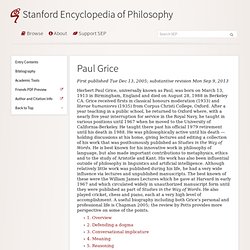
Grice received firsts in classical honours moderation (1933) and literae humaniores (1935) from Corpus Christi College, Oxford. After a year teaching in a public school, he returned to Oxford where, with a nearly five year interruption for service in the Royal Navy, he taught in various positions until 1967 when he moved to the University of California-Berkeley. He taught there past his official 1979 retirement until his death in 1988. He was philosophically active until his death — holding discussions at his home, giving lectures and editing a collection of his work that was posthumously published as Studies in the Way of Words. 1.
This distinction between meaning and use has found many applications in philosophy, linguistics and artificial intelligence. 2. 3. I'm low on gas. Implicature. First published Fri May 6, 2005; substantive revision Wed Sep 22, 2010 “Implicature” denotes either (i) the act of meaning, implying, or suggesting one thing by saying something else, or (ii) the object of that act.
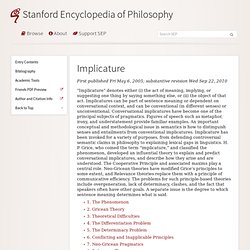
Implicatures can be part of sentence meaning or dependent on conversational context, and can be conventional (in different senses) or unconventional. Conversational implicatures have become one of the principal subjects of pragmatics. Figures of speech such as metaphor, irony, and understatement provide familiar examples. An important conceptual and methodological issue in semantics is how to distinguish senses and entailments from conventional implicatures. 1. H. Alan: Are you going to Paul's party? Ancient Logic. First published Wed Dec 13, 2006 Logic as a discipline starts with the transition from the more or less unreflective use of logical methods and argument patterns to the reflection on and inquiry into these and their elements, including the syntax and semantics of sentences.
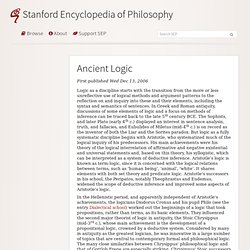
Dialectical School. First published Fri Aug 27, 2004; substantive revision Thu Aug 11, 2011 The ‘Dialectical school’ denotes a group of early Hellenistic philosophers that were loosely connected by philosophizing in the — Socratic — tradition of Eubulides of Miletus and by their interest in logical paradoxes, propositional logic and dialectical expertise. .
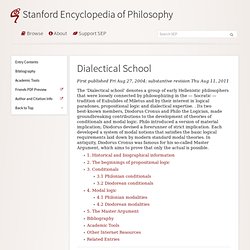
Its two best-known members, Diodorus Cronus and Philo the Logician, made groundbreaking contributions to the development of theories of conditionals and modal logic. Philo introduced a version of material implication; Diodorus devised a forerunner of strict implication. Each developed a system of modal notions that satisfies the basic logical requirements laid down by modern standard modal theories. In antiquity, Diodorus Cronus was famous for his so-called Master Argument, which aims to prove that only the actual is possible. 1. Formal Representations of Belief. First published Wed Oct 22, 2008; substantive revision Mon Jan 6, 2014 Epistemology is the study of knowledge and justified belief.
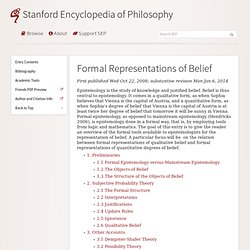
Belief is thus central to epistemology. Epistemic Paradoxes. First published Wed Jun 21, 2006; substantive revision Fri Dec 30, 2011 Epistemic paradoxes are riddles that turn on the concept of knowledge (episteme is Greek for knowledge).
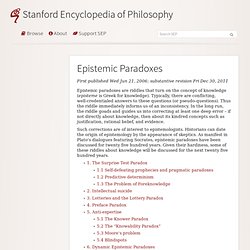
Typically, there are conflicting, well-credentialed answers to these questions (or pseudo-questions). Thus the riddle immediately informs us of an inconsistency. In the long run, the riddle goads and guides us into correcting at least one deep error – if not directly about knowledge, then about its kindred concepts such as justification, rational belief, and evidence. Epistemic Paradoxes. First published Wed Jun 21, 2006; substantive revision Fri Dec 30, 2011 Epistemic paradoxes are riddles that turn on the concept of knowledge (episteme is Greek for knowledge).
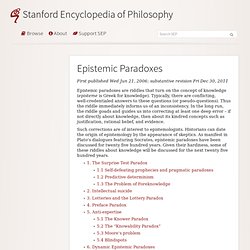
Typically, there are conflicting, well-credentialed answers to these questions (or pseudo-questions). Thus the riddle immediately informs us of an inconsistency. In the long run, the riddle goads and guides us into correcting at least one deep error – if not directly about knowledge, then about its kindred concepts such as justification, rational belief, and evidence. Such corrections are of interest to epistemologists. Bayesian Epistemology. First published Thu Jul 12, 2001; substantive revision Wed Mar 26, 2008 ‘Bayesian epistemology’ became an epistemological movement in the 20th century, though its two main features can be traced back to the eponymous Reverend Thomas Bayes (c. 1701-61).
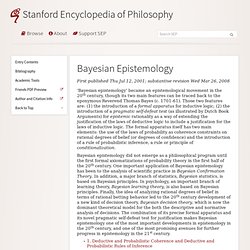
Those two features are: (1) the introduction of a formal apparatus for inductive logic; (2) the introduction of a pragmatic self-defeat test (as illustrated by Dutch Book Arguments) for epistemic rationality as a way of extending the justification of the laws of deductive logic to include a justification for the laws of inductive logic. Dutch Book Arguments. First published Wed Jun 15, 2011 The Dutch Book argument (DBA) for probabilism (namely the view that an agent's degrees of belief should satisfy the axioms of probability) traces to Ramsey's work in “Truth and Probability”.
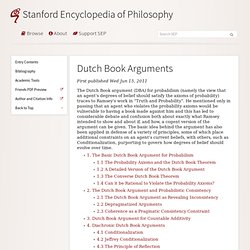
He mentioned only in passing that an agent who violates the probability axioms would be vulnerable to having a book made against him and this has led to considerable debate and confusion both about exactly what Ramsey intended to show and about if, and how, a cogent version of the argument can be given. Interpretations of Probability. First published Mon Oct 21, 2002; substantive revision Mon Dec 19, 2011 ‘Interpreting probability’ is a commonly used but misleading characterization of a worthy enterprise.
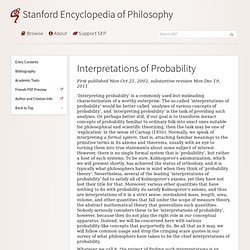
The so-called ‘interpretations of probability’ would be better called ‘analyses of various concepts of probability’, and ‘interpreting probability’ is the task of providing such analyses. Or perhaps better still, if our goal is to transform inexact concepts of probability familiar to ordinary folk into exact ones suitable for philosophical and scientific theorizing, then the task may be one of ‘explication’ in the sense of Carnap (1950).
Normally, we speak of interpreting a formal system, that is, attaching familiar meanings to the primitive terms in its axioms and theorems, usually with an eye to turning them into true statements about some subject of interest. However, there is no single formal system that is ‘probability’, but rather a host of such systems. Ultrafilter. Filter. The Algebra of Logic Tradition. First published Mon Mar 2, 2009; substantive revision Fri May 1, 2009 The algebra of logic as introduced by Boole in his Mathematical Analysis of Logic (1847) was designed to provide an algorithmic alternative (via a slight modification of ordinary algebra) to the traditional catalog approach of Aristotelian logic.
However, three-fourths of the way through this book, after finishing his discussion of Aristotelian logic, Boole started to develop the general tools that would be used in his Laws of Thought (1854) to greatly extend the Aristotelian logic by permitting an argument to have many premises and to involve many classes. To handle the infinitely many possible logical arguments of this expanded logic, he presented theorems that provided key tools for an algorithmic analysis (a catalog was no longer feasible). The Mathematics of Boolean Algebra. First published Fri Jul 5, 2002; substantive revision Fri Feb 27, 2009 Boolean algebra is the algebra of two-valued logic with only sentential connectives, or equivalently of algebras of sets under union and complementation.
The rigorous concept is that of a certain kind of algebra, analogous to the mathematical notion of a group. This concept has roots and applications in logic (Lindenbaum-Tarski algebras and model theory), set theory (fields of sets), topology (totally disconnected compact Hausdorff spaces), foundations of set theory (Boolean-valued models), measure theory (measure algebras), functional analysis (algebras of projections), and ring theory (Boolean rings). The study of Boolean algebras has several aspects: structure theory, model theory of Boolean algebras, decidability and undecidability questions for the class of Boolean algebras, and the indicated applications. 1.
Modal Logic. 1. What is Modal Logic? Narrowly construed, modal logic studies reasoning that involves the use of the expressions ‘necessarily’ and ‘possibly’. However, the term ‘modal logic’ is used more broadly to cover a family of logics with similar rules and a variety of different symbols. A list describing the best known of these logics follows. 2. The most familiar logics in the modal family are constructed from a weak logic called K (after Saul Kripke).
Necessitation Rule: If A is a theorem of K, then so is □A. Epistemic Logic. First published Wed Jan 4, 2006 Epistemic logic is the logic of knowledge and belief. It provides insight into the properties of individual knowers, has provided a means to model complicated scenarios involving groups of knowers and has improved our understanding of the dynamics of inquiry. 1. Epistemology. 1. Belief. First published Mon Aug 14, 2006; substantive revision Sun Nov 21, 2010 Contemporary analytic philosophers of mind generally use the term “belief” to refer to the attitude we have, roughly, whenever we take something to be the case or regard it as true. Diagrams. 1. Introduction Diagrams or pictures probably rank among the oldest forms of human communication. Second-order and Higher-order Logic. The Identity of Indiscernibles. Possible Objects. Willard van Orman Quine. Structured Propositions. Propositions. The Deflationary Theory of Truth. Montague Semantics. Self-Reference.
Paradoxes and Contemporary Logic. Kurt Gödel. Liar Paradox. Epimenides Paradox. Eubulides Paradox. Dialectical School. Gottlob Frege. Compositionality. Truth. The Correspondence Theory of Truth. Alfred Tarski. Schema. The Deflationary Theory of Truth. Set Theory. The Early Development of Set Theory. Galileo's paradox. Galileo Galilei. Course Material - Munich Center for Mathematical Philosophy (MCMP) - LMU Munich. Aristotle's Logic. Aristotle. History of Philosophy without any gaps. Zeno of Elea. Parmenides. Cusanus, Nicolaus [Nicolas of Cusa] Definitions. Moral Cognitivism vs Non-Cognitivism - derfshaya - Gmail. Aesthetic Judgment. Philosophy of Mathematics. Set Theory.